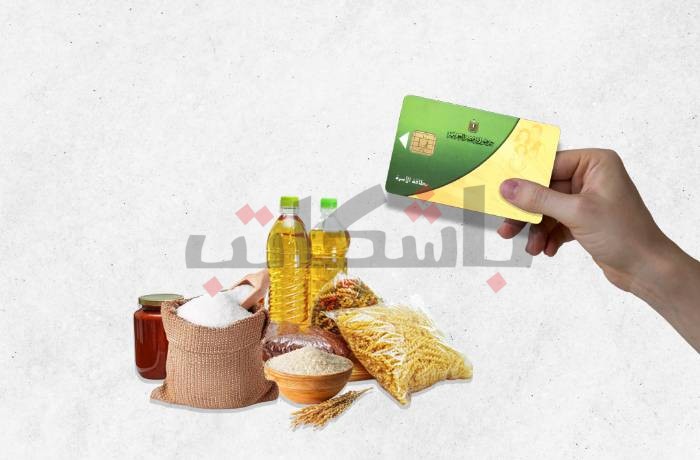“I am a housewife, my family consists of five members; I, the father, and three children. After the latest increase in the prices, I felt my husband’s salary value had decreased by half, prices of all basic food commodities increased significantly, yet in return the salaries stayed the same”.
“H. P.”, a lady in her fifties, stays quiet for a while, then continues her sad words, saying “ration is important to us, our income is not big enough to cover all our needs amidst the current prices in the market, however, the problem is the prices of these subsidised commodities have increased compared to the ration card allotment, so the quantity I used to get and depend on in the past I get now almost half of it, and some commodities are not available, and others are available but in low quality”.
Data issued by the Central Agency for Public Mobilisation and Statistics indicate that inflation reached 28.5% last January on an annual basis, which is its highest since 2017, nearly explaining the major increase in the prices of food commodities in Egypt in the last months. Subsidised commodities were no exception, despite being less expensive than those not covered by the Ration Card, yet still the increase in prices the government was forced to implement led to the decrease in the quantity of the commodities the families used to get.
Consequently, families are forced to purchase the rest of what they need from basic commodities at consumer market prices that are approximately multiple times the value specified for the commodities available in subsidised goods outlets.
In order to cope with such circumstances, H.’s family started to apply several measures, “I replaced local beef with the frozen beef sold in the government outlets at lesser prices than the market, I reduced the monthly quantity of meat in general, so instead of 5 chicken I buy only two, and I stopped buying other items like eggs for being overly priced and I can’t afford them, we tended to eating more yellow lentils and Koshary, as they cost less and make us feel full, as for the rice I replaced it with bread and pasta”.
Then “H” added, “all subsidised goods outlets in Port Said depend on the same products, and sometimes they are not available in one outlet so we have to search for them in other ones. Six months ago, we used to get 9 bottles of oil, but now we get only four 750 g bottles”.
“H” justifies that this quantity is not enough for her family as their diet now depends on foods that need more oil, and even if this is not healthy it makes them full, “we buy what we need from the market, which are very expensive brands”.
“H” fears that prices would keep increasing whereas her husband’s salary would stay the same, threatening them from purchasing basic commodities she depended on to feed her family and the ration card helped her in obtaining them, “at least I guarantee getting rice or pasta and oil or ghee and sugar, as for soap and detergent and tomato sauce, most of the time they are not available, and in general the ration card allotment won’t be enough to purchase them too”.
Despite the Egyptian government attempts to lessen the effect of increasing commodities prices by approving an increase of the ration card allotment starting last September up to next June, yet the percentage of increase in commodities prices starting last November with the continuous decrease of the Egyptian Pound value, couldn’t match this increase in the ration card allotment and was also reflected on the availability and quantity of the commodities.
The Government’s decision was to increase the allotment to 100 EGP per family, increasing to 200 EGP if there are two families included in one card, and 300 for three families and so on, that to add to the basic value of the subsidy which amounts to 50 EGP per individual with the maximum of four individuals in each ration card, and 25 EGP for the fifth individual added, which is the subsidy value established since July 2017.
“H” says that her family didn’t receive this increase, adding “we submitted a grievance applying the required documents to the Subsidy Office, but they informed us that updating the lists has not yet come”.
Monthly data issued by the Central Agency for Public Mobilization and Statistics shown that the food prices recorded increased by 48%, clarifying that the increase in the criteria of grains and bread reached 6.6%, meat and poultry 20.6%, fish and seafood 9.4%, dairy, cheese and eggs 10.3%, oils and fats 7.8%, and fruits 3.8%.
The government tries through opening new subsidised goods outlets in the governorates to create new ways for the citizens to buy commodities with lesser prices than those in the market, yet it hits a dead end as the salaries stay the same whereas the prices keep increasing.
Ibrahim, 35 years old, stood in front of one of the subsidised goods outlets talking with his wife acting as a link between her and the vendor, “is powdered milk available this month? Is there any news about additional subsidy? Can we exchange bags of rice? Are there any other items we can get?”, all the vendor’s answers were “No”, until the conversation turned to Ibrahim blaming the vendor and the latter defending himself in anger.
Ibrahim’s salary is three thousand a month, whereas he says he needs double this salary to only feed his family, let alone other expenses like paying rent or transportation or medicine, adding “I dare not even mention entertainment expenses”.
“A family needs 10 thousand pounds to live well, what can I do?”, Ibrahim comments.
For Ibrahim, the ration card is supposed to provide families with low income with sufficient basic commodities at least, so they won’t have to buy them from the market, and in the end this subsidy is supposed to mainly support citizens based on their low income.
“H” and Ibrahim’s words were nearly similar to other families, with the repetitive theme of “fear” from the consecutive rapid increase in prices unparalleled with an increase in their monthly incomes.


